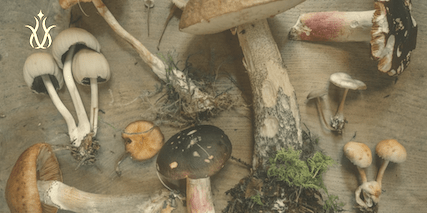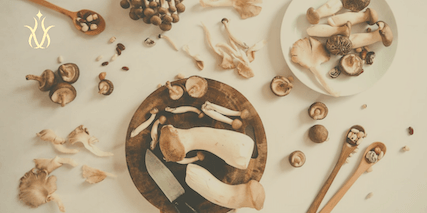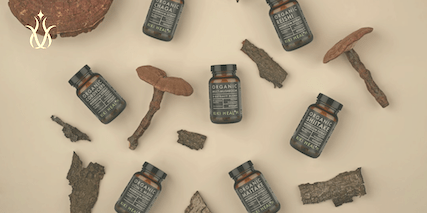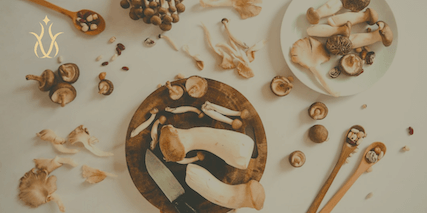Explore the potent world of medicinal mushrooms, nature’s hidden gems for boosting health and vitality. This ultimate guide answers all your questions about different types of medicinal mushrooms such as Reishi, Chaga, Lion’s Mane, and Cordyceps. Discover their numerous health benefits, including immune system support, cognitive enhancement, and stress reduction. Learn how to safely use these mushrooms, the best forms to consume (from teas to tinctures), and tips for integrating them into your daily diet.
Whether you’re looking to improve your overall health or target specific wellness goals, find out how medicinal mushrooms can be part of your solution.
Are Mushrooms Healthy?
Yes, mushrooms can be a healthy addition to your diet. They are low in calories, cholesterol-free, fat-free, gluten-free, and contain only a small amount of sodium. Additionally, they are rich in fibre, vitamins, and minerals.
Here are some key nutrients you can find in mushrooms:
B vitamins: Mushrooms are rich in folate (B9), riboflavin (B2), thiamine (B1), pantothenic acid (B5), and niacin (B3). These vitamins help the body produce the red blood cells that carry oxygen throughout the body as well as utilise energy from the food we consume.
Vitamin D: Certain types of mushrooms can provide vitamin D when exposed to sunlight. Vitamin D is important for bone health.
Selenium: This is a powerful antioxidant that helps prevent damage to cells and tissues and supports the immune system.
Potassium: An important mineral that many people do not get enough of, potassium aids in muscle and nerve function and helps maintain healthy blood pressure.
Beta-glucans: Found in various types of mushrooms, β glucan sugars may help in improving insulin resistance and blood cholesterol levels, thus lowering the risk of obesity and providing a boost to our immune system.
While they are highly nutritious, it’s important to consume them as part of a balanced diet. Some mushrooms are not edible and can be poisonous, so knowing which mushrooms are safe to eat is crucial. Always make sure to cook mushrooms properly, as some may contain compounds that could upset the stomach when eaten raw.

Which Mushrooms are Best for You?
While most edible mushrooms contain beneficial nutrients and antioxidants, some have unique health benefits. Here are some particularly nutritious types of mushrooms:
White Button Mushrooms:
The white button mushroom is the most common type of mushroom and is rich in polysaccharides that have anticancer properties. They are also a good source of B vitamins and minerals like selenium and copper.
Cremini Mushrooms:
Also known as baby bellas or brown mushrooms, they contain a wide variety of vitamins and minerals, including Vitamin B5, which helps with adrenal function.
Portobello Mushrooms:
These are mature cremini mushrooms with a meaty texture. They are rich in B vitamins and also contain various essential minerals.
Shiitake Mushrooms:
They are a great source of iron and B vitamins. They also contain lentinan, a type of sugar molecule that boosts the immune system and may have anticancer properties.
Reishi Mushrooms:
Reishi mushrooms are well known for their immune-boosting properties and have been used in traditional medicine for centuries. They contain triterpenoids, polysaccharides, and peptidoglycans, which may have anticancer, antiviral and antibacterial properties.
Maitake Mushrooms:
Also known as ‘hen of the woods,’ these mushrooms have potent immune-boosting properties and may help control blood sugar levels.
Lion’s Mane Mushrooms:
Known for their brain-boosting power, lion’s mane mushrooms may promote nerve growth factors and support brain health.
Oyster Mushrooms:
The oyster mushroom is low in calories yet rich in protein, fibre, niacin and riboflavin. The oyster mushroom also contains a decent amount of potassium.
Morel Mushrooms:
Morels are rich in vitamin D and also have a good amount of iron.
Chaga Mushrooms:
Often consumed in tea or supplement form, Chaga mushrooms are packed with antioxidants and can boost your immune system.
It’s important to note that while all these mushrooms have health benefits, they should be properly cooked and consumed as part of a balanced diet. Some people may have allergies or intolerance to certain types of mushrooms, so if you’re trying a type of mushroom for the first time, start with a small quantity to see how your body reacts.

What are Medicinal Mushrooms?
Medicinal mushrooms are fungi that are thought to have healing properties. They have been used for thousands of years, especially in traditional Asian medicine, for their various health benefits. These mushrooms contain a variety of compounds, such as polysaccharides, glycoproteins, ergosterols, and triterpenoids, which can contribute to human health in a number of ways.
Here are some of the most well-known medicinal mushrooms:
Reishi Mushrooms (Ganoderma lucidum): Often referred to as the “mushroom of immortality,” reishi is known for its potential to boost the immune system, fight fatigue and depression, and reduce heart disease and cancer risk.
Shiitake Mushrooms (Lentinula edodes): Shiitake mushrooms are rich in polysaccharides like lentinan, which are known for their immune-boosting and anticancer properties.
Cordyceps Mushrooms (Cordyceps sinensis): Cordyceps are known for their ability to increase energy, enhance stamina, and reduce fatigue. They have been used to help manage the symptoms of respiratory disorders, kidney disorders, and heart disease.
Lion’s Mane Mushrooms (Hericium erinaceus): Lion’s mane mushrooms may support brain health, relieve mild symptoms of anxiety and depression, and help to reduce heart disease risk.
Turkey Tail Mushrooms (Trametes versicolor): Known for their immune-boosting properties, turkey tail mushrooms may also help in fighting certain cancers. Turkey tail contains compounds called polysaccharopeptides, including Krestin (PSK) and Polysaccharide Peptide (PSP), which are believed to have immunomodulatory effects. This means turkey tail mushrooms can potentially boost a weak immune system or regulate an overactive one.
Turkey tail mushrooms are also a source of prebiotics, which can help maintain a healthy gut.
Chaga Mushrooms (Inonotus obliquus): Chaga mushrooms have antioxidant properties. They’ve been used to improve digestive health, boost the immune system, and reduce inflammation.
Maitake Mushrooms (Grifola frondosa): Maitake mushrooms can help enhance the immune system and may also help regulate blood pressure, glucose, insulin, and both serum and liver lipids, such as cholesterol, triglycerides, and phospholipids.
While these mushrooms have been used medicinally for thousands of years, and modern research shows promising health benefits, more rigorous clinical trials are needed to fully understand their potential.
Additionally, while generally safe for most people, they can occasionally cause allergic reactions and may interact with certain medications.
Medicinal Mushrooms and Their Role in Cancer Treatment
In recent times, medicinal mushrooms garnered attention within the scientific community for their potential therapeutic effects, especially in relation to cancer treatment.
In numerous animal studies, researchers have delved into understanding the efficacy of mushroom extracts in treating or preventing the progression of cancer. These animal models, especially mouse models, serve as a crucial first step in determining the potential effects of substances on mammalian systems before they can be translated to human trials.
Several mushrooms have shown promise. For instance, there are indications from some studies that certain mushroom extracts can impede the growth of prostate cancer and breast cancer cells. These findings are significant, but they’re primarily based on in vitro (test tube) experiments or animal models. This means that while they provide a foundation for understanding the compounds at work, they don’t directly translate to efficacy in human treatments.
Moreover, while mushrooms like shiitake, maitake, and reishi have been researched for potential anti-cancer properties, the Food and Drug Administration (FDA) has not approved them as standalone treatments for cancer. This is due to the need for more comprehensive human clinical trials to ascertain safety and efficacy.
However, within the realm of complementary and alternative medicine, many practitioners and patients consider medicinal mushrooms as a supplementary treatment. They’re not usually used in isolation but alongside traditional cancer treatments. The intention is often to potentially enhance the efficacy of conventional treatments or to alleviate some of their side effects.
The gold standard for proving the efficacy of any treatment is through double-blind, randomized controlled trials. Few such rigorous studies have been conducted regarding the effect of medicinal mushrooms on cancer patients. But, anecdotal evidence and some preliminary studies suggest potential benefits, including improved quality of life for lung cancer patients or immune system modulation in other types of cancer patients.
It is important to stress that while medicinal mushrooms might offer some benefits, they should not be seen as a replacement for conventional cancer treatments. Always consult with a medical professional when considering any complementary or alternative treatments.
In conclusion, while promising preliminary results have emerged from research on animal models regarding the anti-cancer properties of medicinal mushrooms, more rigorous human trials are needed. Especially for those diagnosed with conditions like prostate cancer, lung cancer, or breast cancer, it’s crucial to rely on proven treatments, even if they decide to explore mushrooms as a complementary approach. As always, treatment decisions should be made in consultation with healthcare professionals who can provide guidance tailored to individual cancer patients.
How Do You Take Medicinal Mushrooms?
Medicinal mushrooms can be consumed in several forms, and the method of mushroom consumption often depends on the form in which they’re purchased.
Here are some common ways:
Whole or Dried Mushrooms: These can be added to soups, stews, or teas. They are usually simmered for a long period to extract the beneficial compounds.
Powdered Mushrooms: These can be mixed into hot water to make tea or added to smoothies, juices, soups, or other foods. Some people also encapsulate powdered mushrooms for easier consumption.
Capsules or Tablets: These are taken orally, usually with water, according to the recommended dosage on the package.
Liquid Extracts or Tinctures: These are typically taken orally, often mixed into a beverage like water or tea. The recommended dosage will depend on the exact concentration of the extract.
Tea Bags: Some manufacturers sell medicinal mushrooms in tea bag form. You would steep these in hot water like traditional tea.
Regardless of the form, following the manufacturer’s recommended dosage is important unless a healthcare provider advises otherwise. The dosage can vary depending on the type of mushroom, the form of the product, and the individual’s health status, age, and body weight.
Do Button Mushrooms Have Any Health Benefits?
Button mushrooms, also known as Agaricus bisporus, are not just culinary delights but also carry a basket of nutritional and health gifts. Let’s delve into the wholesome realm of these earthy morsels:
- Nutrient-Rich: Button mushrooms are a source of essential nutrients like selenium, potassium, riboflavin, niacin, and vitamin D. These elements collectively contribute to overall health, from bone strength to antioxidative actions.
- Boost Immunity: Studies suggest that mushrooms can enhance the immune system’s functionality. Their beta-glucan content, a form of soluble dietary fibre, is especially renowned for its immune-boosting properties.
- Antioxidant Powerhouse: Selenium, a potent antioxidant present in mushrooms, plays a pivotal role in liver enzyme function and can help detoxify cancer-causing compounds in the body.
- Heart Health: Button mushrooms offer compounds that can assist in the regulation of blood pressure, circulation, and cholesterol, fostering cardiovascular well-being.
- Weight Management: Being low in calories and high in fibre, mushrooms can be a boon for those aiming for weight control. Their meaty texture offers a satiating experience, making them an excellent choice for those looking for filling, low-calorie food options.
- Bone Health: Unexpectedly, button mushrooms are a natural source of vitamin D when exposed to sunlight. Vitamin D is integral for calcium absorption, thus promoting bone health.
- Digestive Health: The dietary fibre in mushrooms supports a healthy digestive system, promoting regular bowel movements and potentially aiding in the prevention of digestive issues.
- Support Metabolism: B-vitamins, present aplenty in button mushrooms, play a vital role in converting food into energy and can assist in maintaining healthy skin, eyes, and hair.
- Anti-cancer Potential: While research is still ongoing, there’s evidence suggesting that certain compounds in mushrooms might have anti-cancer properties, especially in relation to breast and prostate cancers.
Do Mushroom Supplements Work?
Mushroom supplements, like any other dietary supplements, may provide health benefits, but the effectiveness can vary greatly depending on the individual, the quality of the supplement, the dosage, and the type of mushroom used.
Research suggests that certain mushroom supplements may have various health benefits. For example, reishi mushroom supplements may help boost the immune system, cordyceps could potentially improve exercise performance, and lion’s mane may support cognitive function. Other mushroom types, like turkey tail and maitake, may also support immune health.
However, it’s important to understand that while studies have shown potential benefits, they’re often preliminary and more rigorous, large-scale clinical trials are needed to confirm these findings.
The supplement industry is not as tightly regulated as pharmaceuticals, so the quality of products can vary. When choosing a mushroom supplement, it’s important to look for products that a third party has tested for purity and potency. It’s also recommended to choose a supplement that is made from the whole mushroom (not just the mycelium) and processed without high heat or harsh chemicals, which can preserve the beneficial compounds in the mushrooms.
As with all dietary supplements, it’s best to consult a healthcare provider before starting to take mushroom supplements, especially if you’re pregnant, breastfeeding, have a medical condition, or are taking other medications.

What is Mushroom Complex Good For?
A mushroom complex is a supplement that combines different types of medicinal mushrooms. Each type of mushroom has its unique profile of beneficial compounds and health benefits, and the idea behind a mushroom complex is to provide a broad spectrum of these beneficial compounds in one product.
The benefits of a mushroom complex supplement can include:
Immune Support: Many medicinal mushrooms are rich in beta-glucans, a type of polysaccharide that has been shown to support immune health.
Stress and Fatigue Reduction: Some medicinal mushrooms, such as cordyceps and reishi, are considered adaptogens, which may help the body respond to stress.
Cognitive Health: Certain mushrooms, like lion’s mane, have been shown to support cognitive function and brain health.
Antioxidant Support: Many medicinal mushrooms are packed with antioxidants that can help protect against cellular damage.
Heart Health: Some mushrooms, like shiitake and maitake, contain compounds that may support cardiovascular health by helping to maintain healthy blood pressure and cholesterol levels.
However, it’s important to note that while research suggests potential benefits of medicinal mushrooms, more large-scale, human clinical trials are needed to confirm their effectiveness. Also, mushroom complex supplements can vary widely in terms of the types and amounts of mushrooms they contain, as well as their quality and potency.
As with any dietary supplement, it’s always best to consult with your own healthcare provider before starting to take a mushroom complex, especially if you have a medical condition, are pregnant, breastfeeding, or are taking other medications, or are considering giving the supplement to a child.
Are Medicinal Mushrooms Safe?
In general, medicinal mushrooms are considered safe for most people when used appropriately. However, as with any supplement, there can be potential risks or side effects.
Here are some considerations to bear in mind:
Allergies: Some people may have allergies or intolerances to certain types of mushrooms.
Digestive Upset: Some people may experience digestive symptoms, including bloating, gas, or diarrhoea, especially when first starting to take mushroom supplements.
Drug Interactions: Certain medicinal mushrooms may interact with other medications. For example, they may enhance the effects of anticoagulants (blood thinners), which could increase the risk of bleeding.
If you’re taking any medication, especially for a chronic health condition, it’s important to talk to your physician before starting any new supplement, including medicinal mushrooms.
Immune System Effects: Some medicinal mushrooms can stimulate the immune system, which could potentially be problematic for people with autoimmune diseases.
Quality and Purity: The supplement industry is not as tightly regulated as pharmaceuticals, so the quality and purity of products can vary. Some products may not contain the amount of mushroom stated on the label, and others may be contaminated with other substances. Look for products that a reputable third-party organisation has tested.
Pregnancy and Breastfeeding: The safety of medicinal mushrooms during pregnancy and breastfeeding hasn’t been thoroughly studied, so it’s best to avoid use during these times unless advised by a healthcare provider.
Before starting any new supplement regimen, it’s always best to consult with a healthcare provider or a registered dietitian. They can provide personalised advice based on your individual health needs and circumstances.
Can You Take Too Many Mushroom Supplements?
Yes, like with any dietary supplement, consuming too much is possible. Although medicinal mushrooms are generally considered safe for most people when used as directed, consuming large amounts can potentially cause adverse effects.
Excessive consumption of mushroom supplements can lead to a variety of symptoms, such as stomach upset, including diarrhoea, bloating, and nausea. Some individuals may also experience dry mouth or skin rashes, particularly with excessive use of reishi mushrooms.
Additionally, certain medicinal mushrooms can have immune-stimulating effects, and excessive consumption could potentially overstimulate the immune system, which could be problematic, especially for individuals with autoimmune diseases.
Certain mushrooms might also interact with medications. For example, mushrooms like reishi might have blood-thinning properties and, when taken excessively, could potentially increase the risk of bleeding, especially in people on blood-thinning medications.
Furthermore, the quality and content of mushroom supplements can vary significantly between products, which means that taking a large amount of a poorly made supplement could potentially expose you to contaminants or other unwanted substances.
Where Can You Buy Medicinal Mushrooms?
Medicinal mushrooms can be purchased in several forms, such as whole, dried, powder, liquid extracts, capsules, or tablets, and they are typically available in health food stores, pharmacies, or online.
Here are some places you might consider:
Health Food Stores: These stores often carry a range of medicinal mushroom products, especially in larger cities.
Online Retailers: Websites such as Amazon, iHerb, or Vitacost often carry a wide variety of medicinal mushroom products. Some brands even sell directly from their own websites.
Pharmacies: Larger pharmacies and drugstores often carry medicinal mushroom supplements.
Speciality or Gourmet Food Stores: Some speciality food stores might carry fresh or dried medicinal mushrooms.
Farmers Markets: Depending on where you live, local growers might sell medicinal mushrooms at farmers’ markets.
When purchasing medicinal mushrooms, especially online, be sure to choose products from reputable companies. Look for brands that are transparent about their ingredients, growing and processing methods and that preferably use third-party testing to verify the product’s potency and purity. It can also be helpful to read reviews from other consumers to get a sense of the product’s quality.
What Are the Best Brands of Medicinal Mushrooms?
There are many brands of medicinal mushroom supplements on the market. The quality can vary greatly between products, so choosing a reputable brand is important. When choosing a brand, look for products that are organic, made from whole mushrooms (not just mycelium), and have been third-party tested for purity and potency.
Host Defense:
Founded by mycologist Paul Stamets, Host Defense offers a wide range of mushroom supplements that are certified organic and made from sustainably harvested, USA-grown mushrooms.
Four Sigmatic:
Four Sigmatic offers a range of mushroom coffee, cacao, and elixir products featuring medicinal mushrooms like lion’s mane, reishi, and chaga.
Om Mushrooms:
Om Mushrooms offers a wide range of single-species and blended mushroom supplements, all of which are made from organic, whole-food mushrooms.
Real Mushrooms:
Real Mushrooms prides itself on offering high-quality, organic mushroom extracts made from fruiting bodies rather than mycelium.
Mushroom Science:
Mushroom Science offers a range of medicinal mushroom supplements, and they are one of the few brands that disclose the amount of active compounds (like beta-glucans) on their labels.
Gaia Herbs:
Known for their herbal supplements, Gaia Herbs also offers a line of mushroom supplements using organically grown or sustainably wild-harvested mushrooms.
Mushrooms4Life:
Founded by a leading mycologist, Mushrooms4Life offers a range of organic mushroom supplements sourced from both cultivated and wild-harvested mushrooms.
MycoNutri:
UK-based MycoNutri offers a range of mushroom supplements and is known for its commitment to quality and efficacy.
Please note that while these brands have been noted for their quality, it’s always a good idea to do your own research or consult a healthcare provider when choosing a supplement. Always choose a product that fits your dietary needs, health goals, and budget.
Resources:
Venturella G (2021). Medicinal Mushrooms: Bioactive Compounds, Use, and Clinical Trials. Available at: https://pubmed.ncbi.nlm.nih.gov/33435246/
Kumar K et al (2021). Edible Mushrooms: A Comprehensive Review on Bioactive Compounds with Health Benefits and Processing Aspects. Available at: https://pubmed.ncbi.nlm.nih.gov/34945547/
BBC Good Food. (2017). “The health benefits of mushrooms.” Available at: https://www.bbcgoodfood.com/howto/guide/health-benefits-mushrooms
Friedman M. (2016). “Chemistry, Nutrition, and Health-Promoting Properties of Hericium erinaceus (Lion’s Mane) Mushroom Fruiting Bodies and Mycelia and Their Bioactive Compounds.” Journal of Agricultural and Food Chemistry.
Patel, S., Goyal, A. (2012). “Recent developments in mushrooms as anti-cancer therapeutics: a review.” 3 Biotech. Available at: https://www.ncbi.nlm.nih.gov/pmc/articles/PMC3339609/
Disclaimer: This article is for informational purposes only and should not replace professional medical advice. If you have specific concerns or medical conditions, it is recommended to consult with a healthcare professional for personalised guidance and support.
Related Topics:
Supplements for Anti-Aging – Our Guide
The Incredible Health Benefits of Kombucha
The Ultimate Guide to Ayurveda Medicine: How It Works and What to Expect.






